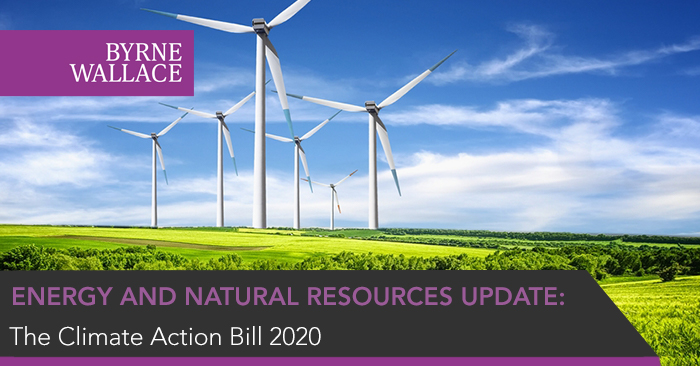The Climate Action and Low Carbon Development (Amendment) Bill 2020
Wednesday, 14 October 2020
Last week the Climate Action and Low Carbon Development (Amendment) Bill (the Climate Action Bill) was launched by Government. The Climate Action Bill amends the Climate Action and Low Carbon Development Act 2015 (the 2015 Act) and addresses a previous criticism of the 2015 Act; namely, its failure to identify specific targets. The Climate Action Bill provides measurable periodic and percentage targets and replaces the 2015 Act’s commitment to transition to a lower carbon economy with the ambitious target of achieving net-zero emissions within the next 30 years.
Key provisions in the Climate Action Bill, include proposals to:
- Enshrine in law for the first time a commitment for Ireland to have net-zero carbon emissions by 2050. The Climate Action Bill defines this “climate neutral economy” as meaning “a sustainable economy, where greenhouse gas emissions are balanced or exceeded by the removal of greenhouse gases”.
- Introduce three five-yearly carbon budgets on an economy-wise basis commencing from 2021, which will set limits on the total amount of greenhouse gases that can be emitted within the State during the relevant five-year period and include provision for sectoral decarbonisation targets. The precise detail of the carbon budgets is not described in the Climate Action Bill but will likely be informed by the stated aim of reducing Ireland’s greenhouse gas emissions by, on average, at least 7% per annum for the next 10 years.
- Enhance the Climate Change Advisory Council by setting it up on a statutory basis, whose responsibility it will be to propose carbon budgets. Appointments to the Council would be made on the basis of the candidate’s expertise in relevant scientific areas and achieving gender balance on the Council is a stated objective in the Bill.
- The 2015 Act’s National Mitigation Plan, which was quashed by the Supreme Court in June this year for want of specificity in its measures to achieve the 2015 Act’s objectives, is to be replaced with an annually revised Climate Action Plan from 2021 and a 10-year National Long Term Climate Action Strategy.
- Mandate the role of local government by requiring each local authority to produce its own “local authority climate action plan”, detailing mitigation and adaptation measures, at least once every five years with the first being prepared within 18 months of the commencement of the legislation.
- Strengthen Oireachtas oversight and accountability whereby an Oireachtas joint committee would be appointed to consider each carbon budget and to which each Minister would be accountable on an annual basis for performance against targets.
The most notable omission from the draft text of the Climate Action Bill is the proposed ban on the sale of new, and importation of, petrol and diesel vehicles by 2030 which had previously been included when the general scheme of the Climate Action Bill was published in December 2019 – and which is also included in the Programme for Government.
No longer Europe’s climate laggard
The objective of achieving net-zero emissions by 2050 is consistent with the European Commission’s proposal for the first European Climate Law, which would legislate for Europe’s economy and society also to become climate-neutral by 2050.
Launching the Climate Action Bill, the Taoiseach, Mícheál Martin TD, described it as “ground-breaking” and that it would have a “transformative impact on our society and economy into the future”. The Climate Action Bill does not stipulate the specific content of the carbon budgets, carbon reducing policies or sectoral targets but does represent a framework to plan, measure and account for a “climate neutral economy”.
The Minister for Climate Action, Communication Networks and Transport, Eamon Ryan TD, stated that the Climate Action Bill represents a “rapid departure for Ireland” which will “change how we heat our homes, generate power, move around our country, grow our food and run our businesses.… I believe it also creates great opportunities for Ireland to be a leader in renewable power, repair and retrofitting, sustainable agriculture and the circular economy.”
Next steps for the Climate Action Bill?
The Climate Action Bill is now due to go to Pre-Legislative Scrutiny. Speaking at the launch of the Bill, Minister Ryan has indicated that the Climate Action Bill may be finalised by the end of the year and that it is hoped it will be enacted and implemented within a year. Given it took several years for climate change legislation to be enacted by way of the 2015 Act, this too could be an ambitious target.
We will continue to monitor the Climate Action Bill’s legislative progress and provide updates on key developments.
For further information on the Bill and other climate action measures, or general legal advice on this topic, contact a member of the ByrneWallace Energy and Natural Resources Team.

